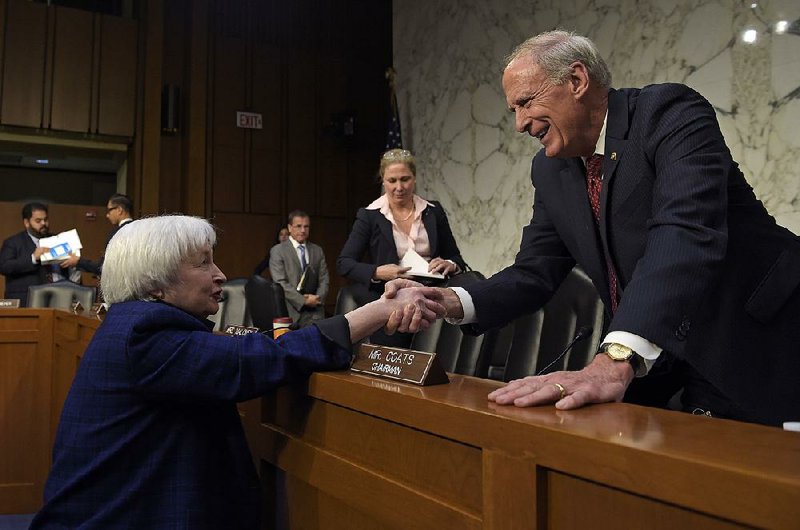WASHINGTON -- Federal Reserve Chairman Janet Yellen told Congress on Thursday that an improving U.S. economy has strengthened the case for raising interest rates. Her comments were seen as increasing the likelihood of a rate change in December.
Yellen also said it was "fully my intention" to remain as Fed chairman until her term ends in January 2018. She said she could not imagine any circumstance that would cause her to leave early, addressing speculation that she might step down when President-elect Donald Trump takes office in January, given his critical comments of her during the election campaign.
In her testimony to a congressional committee, Yellen noted that the job market has made further improvement this year and that inflation, while still below the Fed's 2 percent target, has started to pick up.
She told the committee that reports that have come out since the Fed met in early November show that the economy has continued to make good progress in achieving the goals the Fed wants to see before it raises rates again.
Yellen said that delaying an increase in the policy rate, known as the federal funds rate, for too long could require the Fed to raise rates "relatively abruptly," which would raise the risks of a recession.
"Holding the federal funds rate at its current level for too long could also encourage excessive risk-taking and ultimately undermine financial stability," Yellen said in her testimony to the Joint Economic Committee.
As she has done before, Yellen stressed that future rate increases will likely be gradual, largely because the Fed thinks economic conditions do not require rates to go as high as the Fed has pushed them in years past. Since this economic recovery began in mid-2009, the economy has averaged growth of just 2 percent, below the 3 percent-plus rates of previous recoveries.
Fed officials think slower growth, caused in part by weak gains in worker productivity, and the absence of high inflation pressures will allow the Fed to keep its benchmark rate lower than in previous economic recoveries.
"Gradual increases in the federal funds rate will likely be sufficient to get to a neutral policy stance over the next few years," Yellen said.
Yellen's remarks will serve to cement expectations, barring a significant negative shock, for an increase in interest rates when the Federal Open Market Committee gathers in Washington Dec. 13-14. Pricing in federal funds futures contracts already imply a greater than 95 percent chance of a quarter-point increase.
If the Fed raises rates as expected, it will be its first move since December of last year, when it raised its key rate from a record low near zero, where it had been for seven years. The December meeting will include a news conference by Yellen, when she will be able to explain the Fed's action and perhaps provide guidance on how many further rate increases it foresees in 2017.
"Chair Yellen struck a reasonably -- but still somewhat subdued -- positive tone on the economy, and her words will be seen as signaling a high likelihood that the [Fed] will be tightening policy at next month's meeting," wrote Jim O'Sullivan, chief U.S. economist at High Frequency Economics.
Jonathan Wright, an economics professor at Johns Hopkins University in Baltimore and a former Fed economist, said: "A rate hike in December is a done deal, barring a significant surprise in the next jobs numbers or in financial markets. But the pace of firming is likely to continue to be glacial because the funds rate will then be within about a percentage point of the [Fed's] estimate of neutral," he said, referring to a rate level that neither spurs nor slows the economy.
Information for this article was contributed by Martin Crutsinger of The Associated Press, Binyamin Appelbaum of The New York Times and Christopher Condon and Rich Miller of Bloomberg News.
Business on 11/18/2016
